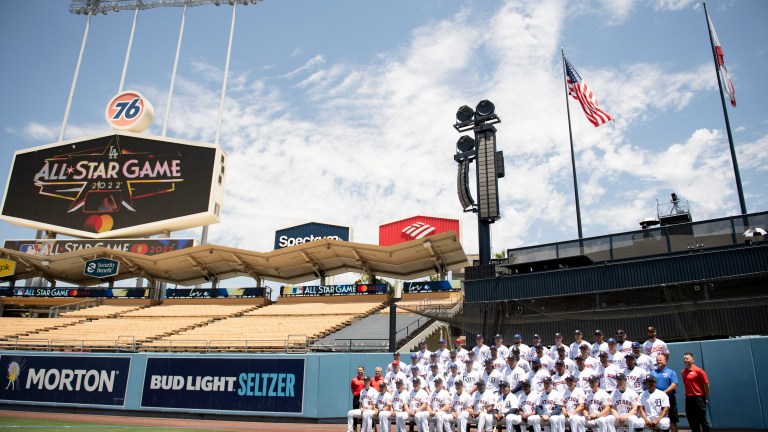Recapping the Last All-Star Game at Dodger Stadium
The MLB All-Star Game has returned to Los Angeles, so let's take a look back at the last time the Dodgers hosted the Midsummer Classic.

It took more than 40 years for baseball’s star showcase to be held in the ultimate star city. And the 1980 All-Star Game at Dodger Stadium became the prototype for the weeklong gala it is today.
While it was a turning point for the Midsummer Classic as an event, the trend of National League dominance continued for the ninth-straight year and 16th time in 17 tries. More dramatic was the fate of the opposing starting pitchers, whose careers would never be quite the same.
Over 56,000 were in attendance and 36 million watched on TV, making it the second-most-viewed All-Star Game ever. They quickly got to know J.R. Richard, the National League’s starting pitcher and a power-throwing right-hander from the Houston Astros who was coming off a 300-strikeout season in 1979.
A brush fire out on the hills beyond the park that appeared as the game began would soon be extinguished, but Richard provided plenty of heat. Add in late-afternoon shadows, and it was practically unfair for AL hitters.
He worked around a walk to Rod Carew in the top of the first. The showdown came with two outs and Reggie Jackson up. Richard got Jackson to chase on a ball in the dirt for an inning-ending strikeout. He fanned two more in the second, overcoming another walk and a single.
Even more impressive than Richard’s performance was that of AL starter Steve Stone. The eventual Cy Young Award winner from the Baltimore Orioles was in complete contrast to his opposition with his mixture of breaking pitches. Stone tossed three perfect innings with three strikeouts.
The scoreless duel lasted for four innings until Fred Lynn, a USC alum, broke the ice in the fifth with a two-run homer off Bob Welch. The National League, which hadn’t had a hit up to this point, answered in their half thanks to Ken Griffey. Twelve years before his son would homer and win the MVP in the All-Star Game, dad was on his way to the same honors after he took Tommy John deep.
The NL took the lead for good in the sixth when George Hendrick singled home Ray Knight and later Phil Garner scored on a Willie Randolph error. More AL miscues led to the insurance runs for the Senior Circuit in the seventh. The Reds’ Dave Concepcion reached on a fielder’s choice, advanced to second on a Dave Stieb wild pitch, then to third on a passed ball by Darrell Porter, and came home on another Stieb wild pitch.
The NL won, 4-2, and would prolong its dominance the following year before the American League eventually seized control. This marked the second time that the Dodgers had hosted the All-Star Game in Los Angeles, the last time being at the Los Angeles Memorial Coliseum back in 1959.
For Richard, all signs pointed to this being the first of many All-Star appearances. But later that month, in a tragic turn of events, Richard collapsed and was diagnosed with a stroke. He never pitched in the major leagues again.
As for Stone, his abundance of curveballs proved to be detrimental to his right arm. By the end of the 1981, a year in which he was 4–7 with a 4.60 ERA, shoulder tendinitis forced Stone to retire at age 34.
Eleven Hall of Famers were on the field that night while three others – George Brett, Steve Carlton, and Jim Rice – did not participate.
Now the All-Star Game is once again back in Los Angeles, as first pitch is scheduled for 8:00 p.m. ET later tonight.
